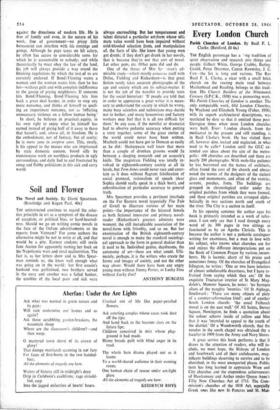Soil and Flower
The Novel and Society. By Diarii Spearman. (Routledge and Kegan Paul, 40s.)
THE uninstructed continue to regard the selec- tive principle in art as a symptom of the disease of escapism, or political bias, or hard-hearted- ness. Should we go on writing comic novels in the face of the Oxfam advertisements or the reports from Vietnam? For some authors the alternative might be not to write at all, and that would be a pity. Earnest students still revile Jane Austen for apparently turning her back on the Napoleonic wars and rural milnutrition. The fact is, as her letters show and as Mrs Spear- man reminds us, she knew well enough what was going on in the world: her first cousin's husband was guillotined, two brothers served in the navy and another was a failed banker, the troubles of the local poor and sick were always encroaching. But her temperament and talent dictated a particular art-form whose old!: mate value would have been impaired without cold-blooded selection from, and manipulation of, the facts of life. Sha knew that young men got drunk; if they don't get drunk in her novels, that is because they're not that sort of novel. Let other pens, etc. Other pens did and do.
One of the theses of Mrs Spy rman's ad- mirable study—which mostly concerns itself with Defoe, Fielding and Richardson—is that great fiction rarely takes accurate photographs of the age and society which are its subject-matter. It is not the job of the novelist to provide texts for the social historian : 'If people are told that in order to appreciate a great writer it is neces- sary to understand the society in which he wrote, many busy scientists and technicians may decide not to bother, and many housewives and factory workers may feel that it is all too difficult for them.' In any case, if the novelist or dramatist had to observe pedantic accuracy when putting a story together, some of the great stories of the world could never have been written. Macbeth could not have got to Duncan as easily as he did: Shakespeare well knew that more than a couple of drunken grooms would lie between a sleeping monarch and an assassin' knife. The magistrate Fielding was totally in volved in eighteenth-century society at all its levels, but Tom Jones could never race and enter., tain as it does without flagrant falsification of social protocol, rationalism of speech (dear. Sophia should really speak in a thick burr), and subordination of particular accuracy to general truth.
Mrs Spearman provides a pertinent interlude on the Far Eastern novel (especially The Tale of Genfi) to illustrate various of her main points—the importance of the leisured female as both fictional innovator and primary novel- reader (Richardson's greatest admirers were women); the still ineradicable association of the novel-form with frivolity, and so on. But her examination of the British eighteenth-century novel is enough to make the standard sociologi- cal approach to the form in general shakier than it used to be. Individual genius, daydreams, the autonomy of art—these are what count. Ulti- mately, perhaps, it is the writers who create the forms and images of society, and not the other way about. Would there have been any angry young men without Jimmy Porter, or Lucky Jims without Lucky Jim?
ANTHONY BURGESS






































 Previous page
Previous page